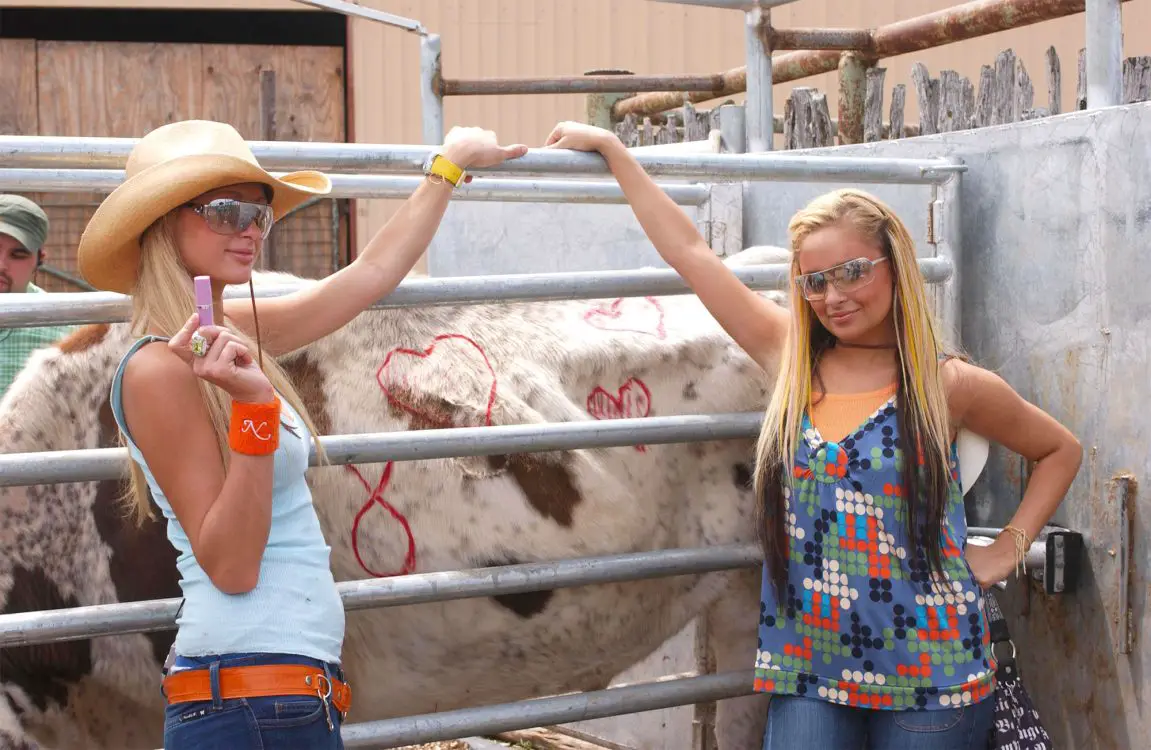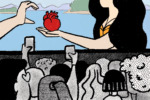It was an era where skimpy was superior and one could never wear too much pink — at least according to heiresses Paris Hilton and Nicole Richie. The Bush-era (early 2000s) was a mishmash of cultural moments ranging from those as menial as mini skirts or as serious as post-9/11 widespread trauma. But the 2003 television series “The Simple Life” seemed to be a comedic break from it all, and followed Hilton and Richie as they tried to survive in rural America.
The two 20-something women, one being the granddaughter of capitalist entrepreneur Conrad Hilton and the other being the daughter of singer Lionel Richie, were removed from their cushy LA habitat. But as they arrived in Altus, Arkansas, adorned in designer couture and carrying a shaky chihuahua, viewers knew they were in for a treat.
Janet, the family matriarch, is shown plucking feathers from a slaughtered chicken as she readies it for cooking. A big-haired grandmother sits idly in her rocking chair, surrounded by lovable country kitsch. The Leding family, who hosted Richie and Hilton during Season 1, depicted idyllic American values. The town in which the two young women stayed, a far cry from the bustling city of Los Angeles, had a population of around 800, which was almost exclusively white. The young women are shown attempting down-home occupations, from milking cows to taxidermy — failing miserably almost every time.
The show’s humor relies on these two extremes of American culture colliding — the filthy rich and the modest conservative Through this, opposite ends of the assumed female identity are depicted: one of lustful luxury and the other of old-fashioned tradition. More specifically, older women in the series are depicted as uptight and condemning, cringing at the “less-is-more” nature of the city girls’ garments.
Viewers, particularly those accustomed to the frenzy of modern non-conservatism on the internet, are led to shout “Loosen up, lady!” at the screen. But the show interestingly diverts from the problematic assumption that working-class, country folk are less capable and intelligent than those who garner extreme wealth.
Hilton and Richie’s alleged inability to complete straightforward tasks, like working at a fast-food drive-thru, are telling. One begins to realize that although the two heiresses are not incapable, they simply do not want to participate. A plethora of antics ensue, from naughty innuendos written on a Sonic billboard to Richie lying that her cat died to avoid paying a debt.
The series is a fascinating reflection of wealth in a 21st-century capitalist society — where the 1 percent can buy exorbitantly priced handbags without lifting a finger, yet others rely on minimum wage just to put food on the table. “The Simple Life” finds courage in exploiting these class differences while simultaneously keeping the viewer laughing. But when the cameras stopped rolling, did the implied ethics linger?
Glamour Magazine described the series as feeding into the notorious “humiliation culture” that loomed over the early 2000s. It was everywhere, from gossip magazines to competition shows. It can be argued that this mentality has a presence in “The Simple Life,” too. Hilton and Richie were made a spectacle with their spoiled, blond rich girl personas, while their working-class counterparts are depicted as belonging to the backwoods.
The two women brought chaos wherever they went, whether that be inhibiting workflow for fast-food employees, or pouring bleach on a pool table out of anger. They ignore the Leding’s curfew and water down paying customers’ milk to avoid extra work while they curse and flip townspeople off. It almost seems as if Hilton and Richie felt, because of their safety net of inherited millions, they need not apply themselves.
But, on the other side of the coin, working-class locals were left to clean up the aftermath. The show’s editing doesn’t depict the locals as being the reasonable ones, but instead as uptight provincial bores who hate having fun. With deeper consideration, viewers realize these people are simply trying to get their paycheck at the end of the day — and the bedazzled, pink antics of Richie and Hilton weren’t making it any easier.
Are the two heiresses truly to blame for their seeming ignorance in “The Simple Life”? In reality, they also fell victim to exploitation. According to an interview with Hilton for Access Hollywood, the young women were persuaded by an unsavory production crew to wreak havoc for entertainment purposes.
Hilton remarked that the producers said, “‘Nicole you play the trouble maker, Paris you play the ditzy airhead.’ We had no idea what we were getting ourselves into or what a huge success it would be and that I’d have to continue playing this character for five years.” Some of the antics portrayed, such as the girls “accidentally” spilling ashes at a crematorium just to vacuum them up, were a farce formulated by the producers. The “ashes” turned out to be just kitty litter.
The infamous milk “scam,” one of the many shock-worthy moments on the show, was actually debunked by internet sleuths as being fabricated. Danny, the owner of Danny’s Dairy Farm, tells Richie and Hilton that the milk is unpasteurized. Upon further research, viewers discovered it is illegal to sell unpasteurized milk in the state of Arkansas, meaning the two women ended up not scamming anybody, except maybe the viewers’ trust.
Nonetheless, the show feeds on a mass-American mentality that resents the generationally wealthy. When the roles are reversed, we are presented with a world of alleged incompetent privilege, where those who hold millions are seemingly unable to do basic tasks. But Richie and Hilton were purposely framed this way, all while the producers raked in the very profits they humorously condemned in the series.
Hilton and Richie, despite their presence in “The Simple Life,” are actually quite down to earth. Hilton frequently works with the LA children’s hospital, as well as advocates for children in “systemically abusive situations, [and] has helped develop federal legislation that will positively impact 120,000 youth annually.” Richie donated the luxury baby shower gifts she received to charity and helped create the Richie Madden Children’s Foundation, which supports mothers and children in need.
“The Simple Life” brings light to a much-debated question: What is the American dream? Perhaps the answer is rooted in what fulfills a person, whether that be partying in Los Angeles or obtaining the cozy twang of a Southern accent. Whatever the case may be, “The Simple Life” portrays a country where the American dream is gatekept by the ultra-rich, the waters of trickle-down economics now resembling a stagnant swamp. The resonating, fabricated reality of the series can be broadly described by a question Hilton poses in Season 1: “What is Walmart? Do they, like, sell wall stuff?”

















